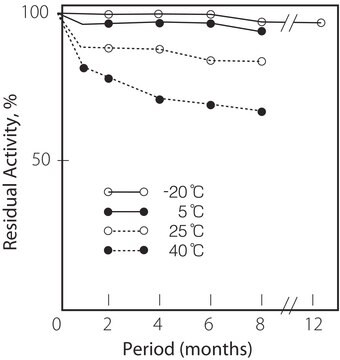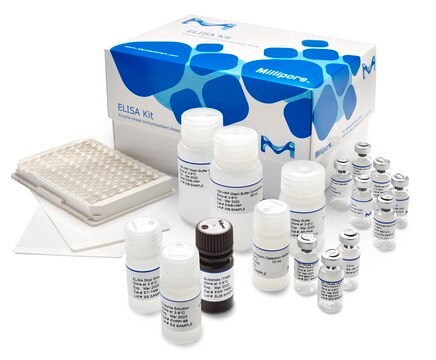Recommended Products
recombinant
expressed in Streptomyces lividans
Quality Level
form
lyophilized solid
specific activity
≥18 unit/mg solid
mol wt
~37 kDa by SDS-PAGE
storage temp.
−20°C
Application
The enzyme sequence is derived from Nocardia sp., and this cholesterol dehydrogenase is expressed in Streptomyces lividans. Cholesterol Dehydrogenase from Nocardia sp. has been used in the preparation of amperometric cholesterol biosensor for cholesterol detection in biological samples and in a study to investigate the atomic structure of the autosomal recessive hypercholesterolemia phosphotyrosine-binding domain with the LDL-receptor tail. Cholesterol dehydrogenase from Nocardia sp. Has also been used in a study to assess organization, dynamics, and segregation of Ras nanoclusters in membrane domains.
Enzyme used in determining cholesterol in serum
Biochem/physiol Actions
Cholesterol dehydrogenase (CDH) is a nicotinamide adenine dinucleotide phosphate (NAD(P)) dependent microbial dehydrogenase that oxidizes the 3-β-hydroxyl group of cholesterol to yield cholest-4-ene-3-one. Cholesterol detection by using CDH allows direct and easier quantification compared to cholesterol oxidase based assay.
Cholesterol dehydrogenase is a NAD(P) dependent microbial dehydrogenase that oxidizes the 3-β-hydroxyl group of cholesterol to yield cholest-4-ene-3-one. Molecular mass of the protein is found to be 37 kDa based on SDS-PAGE. Its pH is 4.5.
Unit Definition
One unit produces 1.0 μmole of cholesten-4-en-3-one per minute at pH 8.5 at 25 °C.
Physical form
Supplied as a lyophilized powder
Signal Word
Danger
Hazard Statements
Precautionary Statements
Hazard Classifications
Resp. Sens. 1
Storage Class Code
11 - Combustible Solids
WGK
WGK 3
Flash Point(F)
Not applicable
Flash Point(C)
Not applicable
Personal Protective Equipment
dust mask type N95 (US), Eyeshields, Gloves
Choose from one of the most recent versions:
Already Own This Product?
Find documentation for the products that you have recently purchased in the Document Library.
Lorant Janosi et al.
Proceedings of the National Academy of Sciences of the United States of America, 109(21), 8097-8102 (2012-05-09)
Recent experiments have shown that membrane-bound Ras proteins form transient, nanoscale signaling platforms that play a crucial role in high-fidelity signal transmission. However, a detailed characterization of these dynamic proteolipid substructures by high-resolution experimental techniques remains elusive. Here we use
Takeshi Nomura et al.
Proceedings of the National Academy of Sciences of the United States of America, 109(22), 8770-8775 (2012-05-16)
Mechanosensitive (MS) channels of small (MscS) and large (MscL) conductance are the major players in the protection of bacterial cells against hypoosmotic shock. Although a great deal is known about structure and function of these channels, much less is known
Hay Dvir et al.
Proceedings of the National Academy of Sciences of the United States of America, 109(18), 6916-6921 (2012-04-18)
Hypercholesterolemia, high serum cholesterol in the form of LDL, is a major risk factor for atherosclerosis. LDL is mostly degraded in the liver after its cellular internalization with the LDL receptor (LDLR). This clathrin-mediated endocytosis depends on the protein autosomal
Our team of scientists has experience in all areas of research including Life Science, Material Science, Chemical Synthesis, Chromatography, Analytical and many others.
Contact Technical Service






